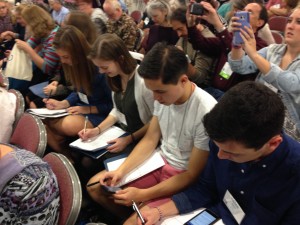
Leaders in racial and religious tolerance encouraged participants at the Parliament of the World’s Religions on Friday to heal bigotry and debunk stereotypes.
The Parliament, taking place in Salt Lake City this weekend, is an international conference created to cultivate harmony among the world’s religious and spiritual communities. One session on mending hearts and healing the legacy of trauma was specifically directed to teaching youth and young adults to be tolerate of all, despite their differences.
The session began with students from Nazareth College giving their experiences of gaining greater religious and racial respect.
Kilaishi Munyakayanza, a Christian and college freshman from Kenya, compared the religious bigotry in Kenya to the racial violence in the United States.
He said that the U.S. has a phobia regarding Islam, and used direct quotes from GOP presidential candidates Donald Trump and Ben Carson to provide evidence. He explained to the audience why this wrong, citing that not all Muslims are the same.
“They have a different culture and come from different countries,” Munyakayanza said. “They are all different and definitely not all violent.”
Munyakayanza called on the youth audience to change America’s view of Islam for future generations to fix “America’s problem.”
“America does not have a Muslim problem,” Munyakayanza said in closing. “America has a racial problem.”
Braa Elkhidir is another student from Nazareth College who addressed the audience. Elkhidir is an Egyptian Muslim who grew up in a community steeped in anti-Semitism. She spoke about how her decision to study the Holocaust changed her perspective.
Politics, not religion, is what created the hatred between the Jews and Muslims in her homeland, Elkhidir explained.
After learning about Jewish history and making Jewish friends, Elkhidir realized she “could not hate people just because of their religion.”
Susan Nowak, who workes with both Munyakayanza and Elkhidir as a professor and chair of religious studies at Nazareth College, followed her students’ remarks.
She praised them for what they learned during cultural exchanges that, according to Nowak, made her realize it is not what she can teach them, but what they can learn together by interacting with those of different faiths and ethnicities.
Nowak’s realization transformed her approach to teaching, she said, adding that she completely changed the courses she taught and started to take her students out to the communities that were discussed in class.
“How do we rebuild if we do not acknowledge what we have done before,” Nowak said. “We want peace, not empty phrases.”
Nowak explained how teaching tolerance and taking her students to places such as Jewish concentration camps in Germany have “really made a difference” in how they view the world.
Corinne Dempsey, an associate professor religious studies at Nazareth College, addressed religious tolerance. “It is not enough to say that we need to get along; we need to know why we don’t,” Dempsey said.
Her classes focus on debunking the theory that different religions cannot get along. She turns her research to the communities where multiple religions co-exist with mutual respect and peace.
“If we think that religious diversity means violence, then how can we have any hope,” Dempsey said. “People can live together as brother and sisters even if they are not the same.”
David Anderson, a visiting community scholar at Nazareth College, shared his skills with the youthful crowd as he told an African folklore version of God’s creation of the Earth. As a former storyteller at the Smithsonian Institution’s Giving Voice: The Power of Words in African American Culture, he said that God created one man: “We all come from the same father, so we are all brothers and sisters.”
The session ended with Matthew Youde, an associate director of global programs for youth leadership development at the United Religions Initiative. Youde broke the audience into groups of seven to 10 students, with one or more adults to talk about culture, religious diversity and unity.
“The key of the activity, as it is in life, is to listen,” Youde said.
More Universe coverage of the Parliament of the World’s Religions:
An introduction to the Parliament of World’s Religions conference
Parliament of World’s Religions opens in Salt Lake City with first-ever Women’s Assembly
Parliament of World’s Religions: Mending young hearts, healing the legacy of trauma
Parliament of the World’s Religions: Opening ceremony celebrates people of all faiths
Parliament of the World’s Religions: Magic demonstrates the golden rule
Parliament of the World’s Religions: Flash mob energizes conference crowd
Parliament of the World’s Religions: BYU faculty weigh in on contraceptive mandate debate
Parliament of the World’s Religions: Powerful women can and do change the world
Parliament of the World’s Religions: How religious identity is used and abused
Parliament of the World’s Religions: Interfaith dialogue and derailing mass murder
Parliament of the World’s Religions: “Compassion Games” transform competition
Parliament of the World’s Religions: Faith groups urged to help eradicate poverty
Parliament of the World’s Religions: Muslim scholars examine ISIS, urge interfaith action
Parliament of the World’s Religions: Clarifying misperceptions about Islam to defeat ISIS
Parliament of the World’s Religions: Heroism embodied in Mandela, King
Parliament of the World’s Religions brings faces from diverse religions
Speeches, performances, and discussion filled the Parliament the World’s Religions




